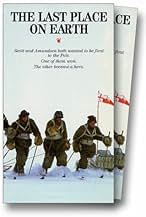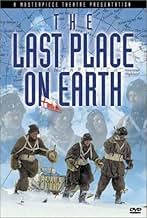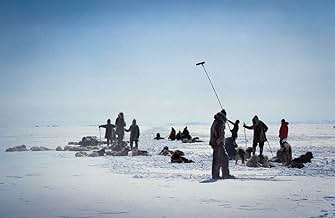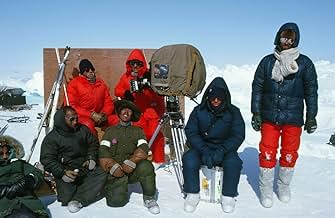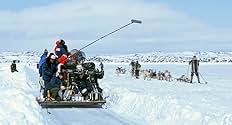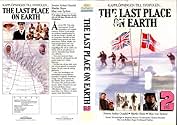IMDb-BEWERTUNG
8,0/10
483
IHRE BEWERTUNG
Füge eine Handlung in deiner Sprache hinzuBased on the book 'Scott and Amundsen' by Roland Huntford, "The Last Place on Earth" is an exploration of the rivalry between Captain Robert F. Scott and Ronald Amundsen as they attempt to r... Alles lesenBased on the book 'Scott and Amundsen' by Roland Huntford, "The Last Place on Earth" is an exploration of the rivalry between Captain Robert F. Scott and Ronald Amundsen as they attempt to reach the South Pole.Based on the book 'Scott and Amundsen' by Roland Huntford, "The Last Place on Earth" is an exploration of the rivalry between Captain Robert F. Scott and Ronald Amundsen as they attempt to reach the South Pole.
Folgen durchsuchen
Empfohlene Bewertungen
This series was a superb production based on Roland Huntford's book. For many years Scott was portrayed as a hero, who died on his return from the Pole. In Death he overshadowed Amundsen's achievement of being first to the pole. Huntford's book and this production, set out to dispell the legend of Scott the Hero.
The start of the series, gives an insight into the direction the whole production goes. It shows Amundsen staying with Eskimos, while Scott is facing the prospect of a court marshall. There can be little doubt in reality that the British Expedition was no match for the experienced collection of Norwegian Explorers. If it had been a sporting event, it would have been classed as a thrashing. After all Amundsens was halfway back to his base when Scott reached the Pole.
The different ideas of the two men is made clear. Amundsen knows he must be first to the pole. He can't afford to be second. He has told his country and government that he is headed for the north pole. He knows that no chances can be taken in a place as unforgiving as the Antartic. Scott however believes that the pole is his by rights, this is probably due to the mentality of the British at that period of time when they had the largest empire the world had seen. He takes only enough supplies to make it there and back, and when he falls behind schedule he starves to death.
It portrays Scotts rivalry with Shakelton, and why Scott pushed on to the Pole, as he felt he had to do better than Shakelton. For many years Scott was considered the Greater Hero. Nowadays it is reversed with Shakelton's concern for his men, is looked on more favourable, thans Scott's reckless actions to push on to the prize.
For all of Scott's mistakes, the show does not go into the bad luck that Scott suffered at the Hands of the weather. Yes, it does snow in the Antartic all the time, but the temperature in the March that year was well below the average for that time of year. Would Scott had made it back in more favourable conditions, we'll never know, but Amundsen knew it was not a place to take chances.
In summing up, this was a superb production, with good acting, directing and setting. I recommend anyone who enjoyed this to read the book as well. Also to read Scott's diary, as it is a masterpiece. Maybe he was more suited to writing than to exploring.
The start of the series, gives an insight into the direction the whole production goes. It shows Amundsen staying with Eskimos, while Scott is facing the prospect of a court marshall. There can be little doubt in reality that the British Expedition was no match for the experienced collection of Norwegian Explorers. If it had been a sporting event, it would have been classed as a thrashing. After all Amundsens was halfway back to his base when Scott reached the Pole.
The different ideas of the two men is made clear. Amundsen knows he must be first to the pole. He can't afford to be second. He has told his country and government that he is headed for the north pole. He knows that no chances can be taken in a place as unforgiving as the Antartic. Scott however believes that the pole is his by rights, this is probably due to the mentality of the British at that period of time when they had the largest empire the world had seen. He takes only enough supplies to make it there and back, and when he falls behind schedule he starves to death.
It portrays Scotts rivalry with Shakelton, and why Scott pushed on to the Pole, as he felt he had to do better than Shakelton. For many years Scott was considered the Greater Hero. Nowadays it is reversed with Shakelton's concern for his men, is looked on more favourable, thans Scott's reckless actions to push on to the prize.
For all of Scott's mistakes, the show does not go into the bad luck that Scott suffered at the Hands of the weather. Yes, it does snow in the Antartic all the time, but the temperature in the March that year was well below the average for that time of year. Would Scott had made it back in more favourable conditions, we'll never know, but Amundsen knew it was not a place to take chances.
In summing up, this was a superb production, with good acting, directing and setting. I recommend anyone who enjoyed this to read the book as well. Also to read Scott's diary, as it is a masterpiece. Maybe he was more suited to writing than to exploring.
This is a fabulous mini-series - a docudrama - about the South Pole expeditions of Norwegian R Amundsen and the British Robert Falcon Scott. The acting and photography are superb, an excellent period piece (although the quality of the DVD itself is a bit grainy).
Unless you've slept under a rock for 100 years, or never read a history book, you know that Amundsen reached the Pole first, and successfully returned, whereas Scott and 4 of his men perished miserably on the return trip. Why? It's all about project management. This DVD is all about properly managing a complicated project dealing with the wilds of nature. Amundsen has 'it' - Scott doesn't.
The Norwegians are highly-skilled at traveling in frozen wastelands. They are in fine physical condition, they know how to ski and handle dog-teams. Amundsen recruits a small team of specialists. He doesn't get too high or low about anything, nor does he get too close to the team--he remains aloof. He makes meticulous preparations.
The British are operated like a Navy Ship under military command: Scott gives orders and doesn't want them questioned. He has a group of favorites, but takes a colossal team of guys, mostly military, but some civilians, who find Scott pompous, arrogant and misguided. He breaks promises and plays the men against each other, while they hope to be in the final group to make the final trek. He sends the wrong guy to purchase Siberian ponies, to save a few bucks, plus he fails to include a couple of key players, including a properly-trained team to tend to the motor sledges. Since there wasn't a Walmart Auto (or Canadian Tire) in the Antarctic, you might wonder what he was thinking. But his biggest problem is the notion of man-hauling the enormous loads all the way to the Pole. you see: no one walks when they can ride. and the Eskimos always rode dog-teams. Scott had experienced some difficulties with dogs in the past, but that's no excuse.
I might direct your attention to a couple of fabulous scenes featuring Bill Nighy, who plays Meares, one of the dog-team drivers. Meares says he'd rather swim back to New Zealand than spend another season under Scott's command. He later tells Scott, in so many words, that he finds it highly unlikely that Scott will live to criticize Meares' choices. Nighy is terrific.
In case you missed it, this screenplay is based on a historical non-fiction piece created after it was discovered that many unflattering portions of Scott's diary were excised from the publication released to the public. There has been quite the resistance from many quarters to a revised viewpoint of a man considered to be a great British hero. Apparently, some recent discovery that the weather was particularly cold when Scott tried to return from the Pole is cited as startling scientific evidence that this presentation of Scott as a peevish incompetent should be set aside. well, whose decision was it to try walking there and back anyway? As Meares says (in this dramatization): 'any man who sits in the Antarctic and whines about the weather is unfit to lead'.
I'll close with a quote, not from this film, but from the 1948 'Scott of the Antarctic' with John Mills. The Scott character (Mills) tells Nansen (the elder statesman of Arctic exploration) that he is going to the South Pole with motor sledges, Siberian ponies, and dogs. Nansen replies that Scott should take dogs, dogs and more dogs.
Amundsen did - Scott didn't. Case closed.
Enjoy this excellent re-creation of events. It's insightful.
Unless you've slept under a rock for 100 years, or never read a history book, you know that Amundsen reached the Pole first, and successfully returned, whereas Scott and 4 of his men perished miserably on the return trip. Why? It's all about project management. This DVD is all about properly managing a complicated project dealing with the wilds of nature. Amundsen has 'it' - Scott doesn't.
The Norwegians are highly-skilled at traveling in frozen wastelands. They are in fine physical condition, they know how to ski and handle dog-teams. Amundsen recruits a small team of specialists. He doesn't get too high or low about anything, nor does he get too close to the team--he remains aloof. He makes meticulous preparations.
The British are operated like a Navy Ship under military command: Scott gives orders and doesn't want them questioned. He has a group of favorites, but takes a colossal team of guys, mostly military, but some civilians, who find Scott pompous, arrogant and misguided. He breaks promises and plays the men against each other, while they hope to be in the final group to make the final trek. He sends the wrong guy to purchase Siberian ponies, to save a few bucks, plus he fails to include a couple of key players, including a properly-trained team to tend to the motor sledges. Since there wasn't a Walmart Auto (or Canadian Tire) in the Antarctic, you might wonder what he was thinking. But his biggest problem is the notion of man-hauling the enormous loads all the way to the Pole. you see: no one walks when they can ride. and the Eskimos always rode dog-teams. Scott had experienced some difficulties with dogs in the past, but that's no excuse.
I might direct your attention to a couple of fabulous scenes featuring Bill Nighy, who plays Meares, one of the dog-team drivers. Meares says he'd rather swim back to New Zealand than spend another season under Scott's command. He later tells Scott, in so many words, that he finds it highly unlikely that Scott will live to criticize Meares' choices. Nighy is terrific.
In case you missed it, this screenplay is based on a historical non-fiction piece created after it was discovered that many unflattering portions of Scott's diary were excised from the publication released to the public. There has been quite the resistance from many quarters to a revised viewpoint of a man considered to be a great British hero. Apparently, some recent discovery that the weather was particularly cold when Scott tried to return from the Pole is cited as startling scientific evidence that this presentation of Scott as a peevish incompetent should be set aside. well, whose decision was it to try walking there and back anyway? As Meares says (in this dramatization): 'any man who sits in the Antarctic and whines about the weather is unfit to lead'.
I'll close with a quote, not from this film, but from the 1948 'Scott of the Antarctic' with John Mills. The Scott character (Mills) tells Nansen (the elder statesman of Arctic exploration) that he is going to the South Pole with motor sledges, Siberian ponies, and dogs. Nansen replies that Scott should take dogs, dogs and more dogs.
Amundsen did - Scott didn't. Case closed.
Enjoy this excellent re-creation of events. It's insightful.
Let me start out by agreeing with everyone who has previously written: it is the best drama about polar adventure ever made.
The viewer should be very skeptical about the Scott defenders because it is evident their homework is shallowly researched and based on a very limited interpretation of Scott's polar problem: that bad luck and bad weather caused his downfall.
I've read Huntford's book 3 times, read the weather article and seen the PBS episode where the young scientist tried to resurrect Scott as a noble, if unfortunate hero. Also, Huntford and his fellow professionals have posted excellent rebuttals regarding these spurious claims about Scott and the weather.
The questions that should put an end to the argument is this: who would get you through safely and who exhibited a breadth of polar knowledge sufficient to AVOID the problems of travel in the brutal Antarctic?
If you said Scott, then you probably thought the Charge of the Light Brigade was a wonderful jaunt through Russian cannon fire just to show how noble and brave you were. Above all else, don't let these half-informed reviewers go without a serious look into the counter-points made to their weak arguments.
Still, the series is a breath-taking look at the human struggle to survive and to seek glory and the dreadful price it takes in lives and in the judgment of history.
The viewer should be very skeptical about the Scott defenders because it is evident their homework is shallowly researched and based on a very limited interpretation of Scott's polar problem: that bad luck and bad weather caused his downfall.
I've read Huntford's book 3 times, read the weather article and seen the PBS episode where the young scientist tried to resurrect Scott as a noble, if unfortunate hero. Also, Huntford and his fellow professionals have posted excellent rebuttals regarding these spurious claims about Scott and the weather.
The questions that should put an end to the argument is this: who would get you through safely and who exhibited a breadth of polar knowledge sufficient to AVOID the problems of travel in the brutal Antarctic?
If you said Scott, then you probably thought the Charge of the Light Brigade was a wonderful jaunt through Russian cannon fire just to show how noble and brave you were. Above all else, don't let these half-informed reviewers go without a serious look into the counter-points made to their weak arguments.
Still, the series is a breath-taking look at the human struggle to survive and to seek glory and the dreadful price it takes in lives and in the judgment of history.
So, here we go again - Scott had it harder than Amundsen, Amundsen was simply doing a "stunt", and so Scott was the more "noble".
If you compare their diaries (and you can now, as Huntford did), Scott stayed in his tent on days when Amundsen and his crew did their fifteen miles (they did fifteen miles a day unless they were completely blizzard-bound - some days in their fur underwear and nothing else). And they had the same weather on nearly the same days. Scott started later, since his teams couldn't travel when it was really cold, so he was out on the land-mass later than Amundsen by nearly a month (which is why he encountered colder temperatures). Scott assumed that changing his headcount from four to five men at the last minute would make no difference in the food supply when they'd very carefully planned exactly how much food they'd need for a four-man team, with no contingency for delays. Amundsen ensured that he'd have at least double the amount of food and fuel he'd need for the whole trip.
As to dogs and ponies - Scott didn't like dogs, because he didn't understand them, either how to work with them, nor how to drive them. The first time he saw dogs being driven properly was on the barrier by Cecil Meares. The scenes where Meares drives past them, and is later found relaxing, waiting for the rest of the teams to arrive are taken verbatim from Scott's and Meares' diaries. Ponies are NOT appropriate for the Antarctic environment, since they have to pull their own food for every mile they're going to walk. Dogs could eat seal and penguin, both of which are native to the Antarctic; they could also eat each other, if necessary.
Amundsen had to trail-blaze an entirely new route, through and over some of the most difficult terrain the Antarctic has to offer. Scott had a map of his route up to the last ninety-seven miles. The Beardmore glacier (Scott's route) is a nice, long, slow climb to the Pole. The Axel Heiberg glacier requires planes flying over it to use their maximum rate of climb; Amundsen and his crew pioneered a route through the ice falls of the Heiberg in less than a week.
And yes, there was a conspiracy to tart up Scott's diaries for public consumption. Scott's widow, Kathleen, worked with J.M. Barrie (of Peter Pan fame) to edit his diaries, making him more of a heroic figure, and cutting out the more disparaging comments Scott made about his companions.
Planning is everything: Scott and his companions died of starvation and scurvy; Amundsen and his crew gained weight on their trip.
I'm not saying that Scott wasn't a brave fellow or that his journey was less than that of Amundsen. I can't imagine man-hauling a 300 lb sledge for hundreds of miles. The tragedy of Scott is that, had he done his research (as Amundsen had), he wouldn't have had to, and he might have beat Amundsen to the pole.
If you compare their diaries (and you can now, as Huntford did), Scott stayed in his tent on days when Amundsen and his crew did their fifteen miles (they did fifteen miles a day unless they were completely blizzard-bound - some days in their fur underwear and nothing else). And they had the same weather on nearly the same days. Scott started later, since his teams couldn't travel when it was really cold, so he was out on the land-mass later than Amundsen by nearly a month (which is why he encountered colder temperatures). Scott assumed that changing his headcount from four to five men at the last minute would make no difference in the food supply when they'd very carefully planned exactly how much food they'd need for a four-man team, with no contingency for delays. Amundsen ensured that he'd have at least double the amount of food and fuel he'd need for the whole trip.
As to dogs and ponies - Scott didn't like dogs, because he didn't understand them, either how to work with them, nor how to drive them. The first time he saw dogs being driven properly was on the barrier by Cecil Meares. The scenes where Meares drives past them, and is later found relaxing, waiting for the rest of the teams to arrive are taken verbatim from Scott's and Meares' diaries. Ponies are NOT appropriate for the Antarctic environment, since they have to pull their own food for every mile they're going to walk. Dogs could eat seal and penguin, both of which are native to the Antarctic; they could also eat each other, if necessary.
Amundsen had to trail-blaze an entirely new route, through and over some of the most difficult terrain the Antarctic has to offer. Scott had a map of his route up to the last ninety-seven miles. The Beardmore glacier (Scott's route) is a nice, long, slow climb to the Pole. The Axel Heiberg glacier requires planes flying over it to use their maximum rate of climb; Amundsen and his crew pioneered a route through the ice falls of the Heiberg in less than a week.
And yes, there was a conspiracy to tart up Scott's diaries for public consumption. Scott's widow, Kathleen, worked with J.M. Barrie (of Peter Pan fame) to edit his diaries, making him more of a heroic figure, and cutting out the more disparaging comments Scott made about his companions.
Planning is everything: Scott and his companions died of starvation and scurvy; Amundsen and his crew gained weight on their trip.
I'm not saying that Scott wasn't a brave fellow or that his journey was less than that of Amundsen. I can't imagine man-hauling a 300 lb sledge for hundreds of miles. The tragedy of Scott is that, had he done his research (as Amundsen had), he wouldn't have had to, and he might have beat Amundsen to the pole.
Roland Huntford's definitive saga of polar exploration, "Scott and Amundsen", is brought very faithfully to film in this 7-episode BBC series. Huntford was the former Scandinavian correspondent for London's "Observer", and his book was the first to debunk Scott's supposed heroic martyrdom.
Beautiful cinematography and several very solid performances by Sverre Anker Ousdal as the introspective and driven Amundsen; Martin Shaw nails the effete martinet, Scott; Michael Maloney is great as Scott's betrayed 2nd Officer, Teddy Evans; Toralv Maurstad as the outspoken Norwegian polar veteran, Hjalmer Johanssen; and, Richard Morant as, W.E.G. Oates, the army officer in a Navy environment and apparently the only man in Scott's party capable of independent thought.
Beautiful cinematography and several very solid performances by Sverre Anker Ousdal as the introspective and driven Amundsen; Martin Shaw nails the effete martinet, Scott; Michael Maloney is great as Scott's betrayed 2nd Officer, Teddy Evans; Toralv Maurstad as the outspoken Norwegian polar veteran, Hjalmer Johanssen; and, Richard Morant as, W.E.G. Oates, the army officer in a Navy environment and apparently the only man in Scott's party capable of independent thought.
Wusstest du schon
- WissenswertesDirector Ferdinand Fairfax had previously worked with Martin Shaw on the TV series The Professionals (1977-81). Whilst he was unimpressed with Lewis Collins ego on that show, he was impressed by Shaw's acting range and desire to be offered more challenging material. So when he was asked to direct this miniseries he successfully lobbied the producers (who were considering Timothy Dalton among others) to meet Shaw. They too liked him and he was eventually offered the lead role.
- PatzerOn his return from the South Pole at 'Framheim,' Amundsen learns that the credit for reaching the North Pole has been taken away from Dr Frederick Cook and given instead to Peary. In reality, Amundsen was well aware of the controversy *before* his departure for Antarctica, and to avoid any question that he had not reached the true South Pole due to faulty navigation, staked out an area of ten miles around what he believed to be the Pole itself.
Top-Auswahl
Melde dich zum Bewerten an und greife auf die Watchlist für personalisierte Empfehlungen zu.
- How many seasons does The Last Place on Earth have?Powered by Alexa
Details
Zu dieser Seite beitragen
Bearbeitung vorschlagen oder fehlenden Inhalt hinzufügen

